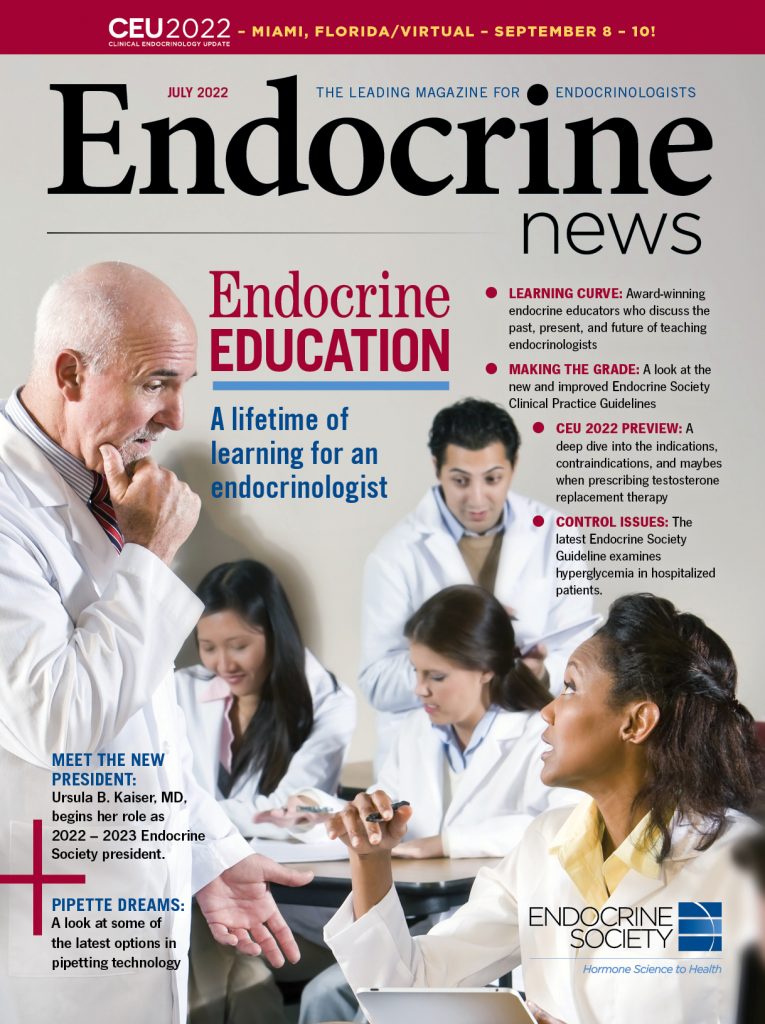
This month, Endocrine News is coming out of gate immediately after ENDO 2022 in Atlanta (and virtually) with an issue devoted to a topic that is always on the top of mind of clinicians and scientists alike: education.
Regardless of a clinician’s stage in his or her career, education plays such an important role throughout the lifecycle of a practicing endocrinologist. To highlight the importance of continuing education, we have a feature that discusses three of the sessions offered at this year’s Endocrine Society Clinical Endocrinology Update in Miami (and virtually) this September. In “A Deep Dive: The Indications,
Contraindications, and Maybes When Prescribing Testosterone Replacement Therapy,” Kelly Horvath talks with Arthi Thirumalai, MBBS, about her two sessions that detail treating low testosterone in men, risk factors, comorbidities, as well as the risk factors. “There’s a lot of inappropriate prescribing that happens through clinics that are not run by physicians or by regulated facilities,” she says, “probably stemming from the fact that if physicians do not feel comfortable having these conversations with their patients, then the patient might then go and seek care in other alternative practices. It’s upon us to be educated about these things so we can have those conversations with our patients.”
On the heels of the release of the Endocrine Society’s latest Clinical Practice Guideline, “Management of Hyperglycemia in Hospitalized Adult Patients in Non-Critical Care Settings: An Endocrine Society Clinical Practice Guideline,” Eric Seaborg has provided an in-depth look of what to expect from this new guideline and why it is remarkably different from previous guidelines in “Control Issues.” “Many of the recommendations in the earlier guideline were based on consensus of panel members without systematic reviews,” says Mary T. Korytkowski, MD, professor of medicine, University of Pittsburgh Medical Center, Pittsburgh, Pa., and chair of the Clinical Guidelines Committee. “There was a lot of mixed-messaging about how to care for these patients — including what their glycemic goals should be and how to best go about achieving those goals.”

Since we’re discussing the Society’s Clinical Practice Guidelines, one of the practice’s most important educational tools for endocrinologists, Kelly Horvath looks at the “refresh” the guidelines have undertaken recently in “Making the Grade.” The Endocrine Society has aligned with over 110 other medical and scientific societies around the world in adopting the GRADE methodology, new standards that will help create the most accurate practice guidelines possible using evidence over expert opinions, minimizing conflicts of interest, and, in a remarkable and refreshing move, considering the input and opinions from actual patients. “We’re able to show our work in a way now that we weren’t able to before, and that speaks to the transparency of the process, which we think is really important,” according to Christopher R. McCartney, MD, professor of endocrinology, endocrinology, and metabolism, University of Virginia School of Medicine, Charlottesville, Va., a member of the Clinical Guidelines Committee since 2016 and who chaired it from 2018 to 2021 “GRADE is probably the most widely accepted standard for guideline development, and the GRADE Working Group continues to refine that methodology.”
Finally, who better to discuss endocrine education than Society members who have been recognized with the highest award for members who have made a different in education by being honored with the Endocrine Society’s Outstanding Educator Laureate Award? In “Learning Curve: Getting Schooled by Award-Winning Endocrine Educators,” Glenda Fauntleroy Shaw spoke with Kenneth D. Burman, MD, Carolyn Becker, MD, Ann Danoff, MD, and Laurence Katznelson, MD, who discuss the most important issues facing endocrine education right now, the best advice they ever received, as well as words of wisdom for the next generation. “I cannot express how deeply I have loved my life in endocrinology, and how lucky I feel that I found my way into the field,” says Danoff, former chief of medicine at the Philadelphia VA and vice chair of medicine at Perelman School of Medicine, University of Pennsylvania, Philadelphia, Pa., when asked what she would tell a student to encourage them today. “Endocrinology offers a window into the most magnificent choreography imaginable. If you are drawn in, just do it.”
I hope this issue gives you some insight to many aspects of endocrine education whether you’re an early-career basic scientist, a mid-career clinician, or a senior level researcher spending most of your days at the bench unlocking the secrets of endocrine science. Learning is a lifelong process, and these are just a few examples of how the Endocrine Society can help you on your educational journey.

